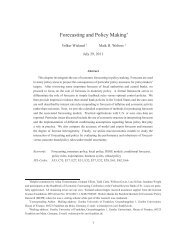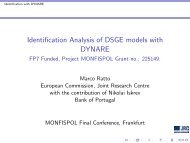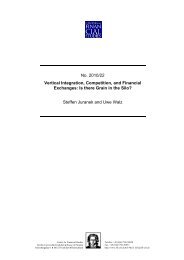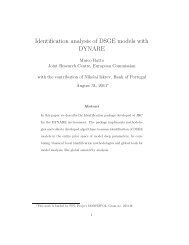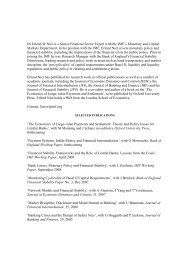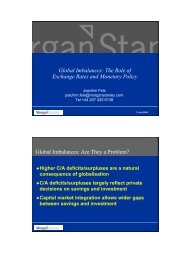r. david mclean, jeffrey pontiff and akiko watanabe - Center for ...
r. david mclean, jeffrey pontiff and akiko watanabe - Center for ...
r. david mclean, jeffrey pontiff and akiko watanabe - Center for ...
You also want an ePaper? Increase the reach of your titles
YUMPU automatically turns print PDFs into web optimized ePapers that Google loves.
momentum that are available immediately be<strong>for</strong>e the ISSUE-construction months, as well as<br />
on the twelve-month lag of ISSUE (LAG-ISSUE). We estimate six different regression<br />
specifications; first using equal-weights, value-weights, <strong>and</strong> scaled-weights with country<br />
dummies <strong>and</strong> then without country dummies.<br />
In all six regressions, the coefficients on size are both negative <strong>and</strong> significant,<br />
suggesting that large firms issue fewer shares than do small firms. The coefficients on the<br />
momentum <strong>and</strong> lagged issuance measures are both positive <strong>and</strong> significant in all six<br />
regressions. This implies that firms with high past returns <strong>and</strong> firms that have recently issued<br />
shares are likely to issue more shares. These findings are consistent with Pontiff <strong>and</strong><br />
Woodgate’s (2006) U.S. findings.<br />
The book-to-market coefficients are positive in all six regressions, but are significant<br />
only in the equal-weighted regressions. This suggests that high book-to-market firms issue<br />
more shares <strong>and</strong> low book-to-market firms buyback more shares, <strong>and</strong> that this pattern is more<br />
strongly observed among large firms. The result is in stark contrast to the findings <strong>for</strong> U.S.<br />
firms, in which low book-to-market firms tend to issue more shares (see Loughran <strong>and</strong> Ritter<br />
(1995), Baker <strong>and</strong> Wurgler (2002) <strong>and</strong> Pontiff <strong>and</strong> Woodgate (2006)).<br />
The use of country dummies does not have a strong effect on the regression<br />
coefficients; economic <strong>and</strong> statistical significances of the coefficients are mostly similar in<br />
the regressions with country dummies <strong>and</strong> those without. However, the average R 2 statistics<br />
from the regressions with country dummies are more than twice as large as those from the<br />
regressions without the dummies. Thus, country of origin explains as much of the variation in<br />
share issuances as do the individual firm characteristics that are included in the regressions.<br />
9



